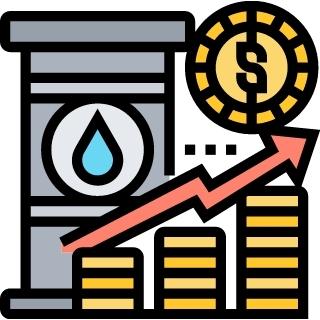When it comes to financial markets, we tend to think almost exclusively of the share and bond markets. But commodities markets represent a vast element of financial trading with substantial sums traded everyday, covering a broad classification of different types of commodity. From oil to corn, from soya to coffee, from steel to aluminium, commodity markets give traders the chance to speculate on alternatives to the financial markets, often with greater volatility and looser opportunities for earning from the markets. As such, the commodities markets represent a core area of trading for more serious investors, and especially when combined with CFDs, the commodity markets are an increasingly popular choice with consumer traders.
Why Do Traders Buy Commodities?
Commodities in essence are very useful goods. Wheat is an essential component in the manufacture of a number of staple foodstuffs – from east to west – ensuring global demand for wheat products amongst manufacturers and wholesalers. Oil is vital in the production of fuel, energy and plastics, and as a result its price is strongly linked to inflation given the sheer number of manufacturers engaged in processing oil into more directly marketable goods and services. As a result, the commodities markets are strong without the need for speculators, because producers need to sell their raw materials while manufacturers require a constant supply of raw materials at stable prices in order to run their businesses. While speculators aren’t strictly a necessity in this picture, they are no doubt lured by this inherent value proposition that underpins the commodities markets. By capitalising on gluts of supply and excess demand, traders can speculate on prices with a view to reselling their commodities to other speculators or end users. And by virtue of the market dynamic, flexible, demand-sensitive prices enable easy speculating for traders who have no interest other than the pecuniary in trading commodity markets.
How Are Commodities Invested In?
Commodities are an awkward beast when it comes to consumer investing. As an end consumer, or a supplier, the infrastructure will already be in place to handle the physical transition of goods. However, for the average price speculator, taking stock of a ton of steel or 20 barrels of oil isn’t generally feasible. Even aside from physically taking stock of the commodity concerned comes the further problem of maintenance, particularly amongst potentially perishable commodities, and the added assumed risk of damage or destruction. For this reason, there is the option to fund warehousing and logistics costs remotely without handling the commodity concerned, although this still represents a cumbersome solution to the problem. Most commonly, commodities are now traded on a cash-only basis, such that the physical handover is avoided. One of the more advantageous way this is achieved for traders is through the use of derivative investment instruments like CFDs, which bring their own peculiar advantages in addition to taking care of the logistic concerns.
Why Are CFDs Traded On Commodities
CFDs are a particularly popular instrument for trading in commodities because, unlike other derivatives, they are not actually linked to the commodity concerned. CFDs are exclusively linked to index and market prices, so there is no need whatsoever to engage directly with the markets – that means your only concern is the movement of the market price for the particular relevant commodity. Aside from the enhanced leverage provided by the advent of margined trading, which enables traders to profit more significantly from an already volatile market, CFDs win on a number of grounds over direct investment in commodities. One of the foremost lies in the ability to short commodities at today’s prices, in order to profit from a decline in their value. This isn’t traditionally possible when you’re buying in an instrument directly, because it requires a positive endorsement – after taking ownership, profiting from a decline in value becomes difficult. However, because CFDs are linked only to the price point, they can easily be bought and sold at either end of the transaction, allowing traders the flexibility to trade on whichever side of the fence represents the most lucrative opportunity for them.
CFDs vs Commodities
CFDs traded on commodities represent a definite improvement in terms as far as the speculator is concerned. Firstly, you circumvent the problems associated with owning 800 bushels of wheat or 40 tons of steel by cutting them out of the picture altogether – with CFDs, the only thing you actually buy and sell is the contract for difference itself, therefore all the difficulties that come with the logistical side of commodities are eradicated. For traders, this is obviously fantastic – only those actively engaged in using the commodities as raw materials in some production process should be concerned at the lack of ownership afforded to traders by CFDs. Secondly, there comes the obvious advantage of leverage. Leverage coupled with commodity market volatility is often a recipe for fireworks, so those that are veering towards the more risk averse end of the market might want to think about an alternative investment model. However, for those with the appetite (and the pockets) to absorb this level of risk, the rewards than can be delivered through trading CFDs on commodity markets are vast, and can eclipse any returns from similar trades in the cash markets directly. Obviously risk is the downside here, and it’s seldom a bad thing to be risk averse – however, if you have the ability and the willingness to take on risk, the combination of CFDs on commodity markets is explosive and potentially highly lucrative.


 The innovations which have helped destroy this barrier, aside from financial spread betting, are mainly derivatives – instruments which create rights in rights, rather than rights in assets directly. Derivatives such as futures, which are contracts compelling purchase/sale of the relevant commodity at a defined future point, or options which give the bearer the option to trade on today’s prices in the future if it makes commercial sense to do so. Perhaps the least complicated method of trading in commodities comes in the form of spread betting, where brokers effectively quote spreads on the price ranges of the relevant commodity market, such that rather than trading in the commodity, you’re trading on a market which has its basis in the underlying commodity price.
The innovations which have helped destroy this barrier, aside from financial spread betting, are mainly derivatives – instruments which create rights in rights, rather than rights in assets directly. Derivatives such as futures, which are contracts compelling purchase/sale of the relevant commodity at a defined future point, or options which give the bearer the option to trade on today’s prices in the future if it makes commercial sense to do so. Perhaps the least complicated method of trading in commodities comes in the form of spread betting, where brokers effectively quote spreads on the price ranges of the relevant commodity market, such that rather than trading in the commodity, you’re trading on a market which has its basis in the underlying commodity price.

